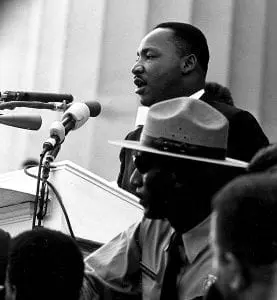The third Monday of January is a great opportunity for society to honor a great man, Martin Luther King Jr. In honor of one of the greatest American heroes of all time, let’s take a look back at the man who had a dream, a dream where all people live as equals regardless of color, race or religion.
Born in Atlanta, GA on January 15, 1929, King’s early childhood was still a turbulent time for race relations in America. King’s first significant exposure to inequality began when he was in school where his white playmates’ parents no longer allowed King to come over and play with him just because he was black. It was this event that made him aware of slavery and segregation, as explained by his mother.
In his first major civil rights action, Martin Luther King, Jr. led the Montgomery Bus Boycott. The protest campaign was against the policy of racial segregation on the public transit system of Montgomery, Alabama. After a lot of time and hardships, the boycott succeeded and it was a great victory for the civil rights movement.
In June 1963, King and other leaders of the civil rights movement organized the famous “March on Washington” and aimed to end racial discrimination in employment and in public schools. It was the largest gathering in Washington, DC’s history, with over 200,000 people in attendance. It was also the site of Martin’s most famous speech, “I Have a Dream.” The Washington March was a great success. A year later, the Civil Rights Act was passed.
For King’s great strides against racial segregation he was honored in 1964 and awarded the Nobel Peace Prize, at the time he was the youngest person to ever receive this award. Unfortunately, others didn’t share the same ideas of non-violence. In 1968, the civil rights leader, Martin Luther King, Jr., was assassinated.
King’s insistence on avoiding violence, his commitment to peace and equality for all, even when confronted with force and brutality were major factors in the success of civil rights in American society. King could talk to great leaders, but he could also talk to common people. His belief in the ability of mankind to live together in peace no matter what race, color, or religion you are is ultimately recognized as a great contribution to the world.

